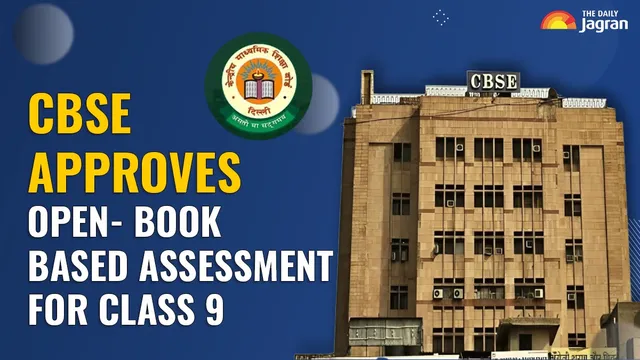- By Sarju Saran Tiwari
- Sun, 10 Aug 2025 10:10 AM (IST)
- Source:JND
CBSE Open-Book Assessments: The Central Board of Secondary Education (CBSE) will introduce open-book based assessments (OBBA) for Class 9 students from the 2026-27 academic session, aiming to shift focus from rote memorisation to conceptual learning. The decision follows a pilot study that received strong teacher support despite revealing performance challenges among students.
According to The Indian Express report, the new format will be part of three pen-paper assessments per term, covering core subjects such as languages, mathematics, science, and social science. The move aligns with the National Curriculum Framework for School Education (NCFSE) 2023 and the National Education Policy (NEP) 2020, which emphasise competency-based education and real-world application of knowledge.
1. Pilot Study Findings and Teacher Response
The 2023-24 pilot study on open-book assessments showed student scores ranging from 12% to 47%, indicating difficulty in applying information from reference materials. However, teachers welcomed the format, citing its potential to enhance critical thinking skills. Feedback stressed the need for structured guidance, helping students navigate textbooks, notes, and other resources effectively.
The pilot focused on “cross-cutting themes” and avoided adding extra reading material, ensuring assessments remained linked to existing curricula.
2. Implementation Plan and Scope
From 2026-27, CBSE will integrate open-book assessments into internal Class 9 exams. These will form part of three written tests per term, with a framework provided to schools on design and evaluation. The adoption will not be mandatory, but sample papers will be developed to maintain quality and focus on higher-order thinking.
The initiative will require capacity building in schools, ensuring teachers can craft questions that test application, analysis, and synthesis rather than direct recall.
3. Educational Goals and Benefits
The primary goal is to reduce exam stress and foster deeper understanding by moving away from memorisation-heavy practices. Students will have access to textbooks and notes during exams, promoting real-world problem-solving skills.
CBSE believes the change will improve conceptual clarity, encourage independent thinking, and prepare students for interdisciplinary challenges. The move is also expected to help learners develop the ability to evaluate, interpret, and apply knowledge in diverse contexts.
4. Past Experience with OTBA
CBSE previously experimented with open-text assessments through the Open Text Based Assessment (OTBA) introduced in 2014 for Classes 9 and 11. Students were given reference materials months in advance to reduce reliance on rote learning. However, the scheme was discontinued in 2017-18 after it failed to significantly boost critical thinking skills.
The new initiative seeks to address past shortcomings by integrating open-book tests into regular exams with more rigorous question design and teacher training.

